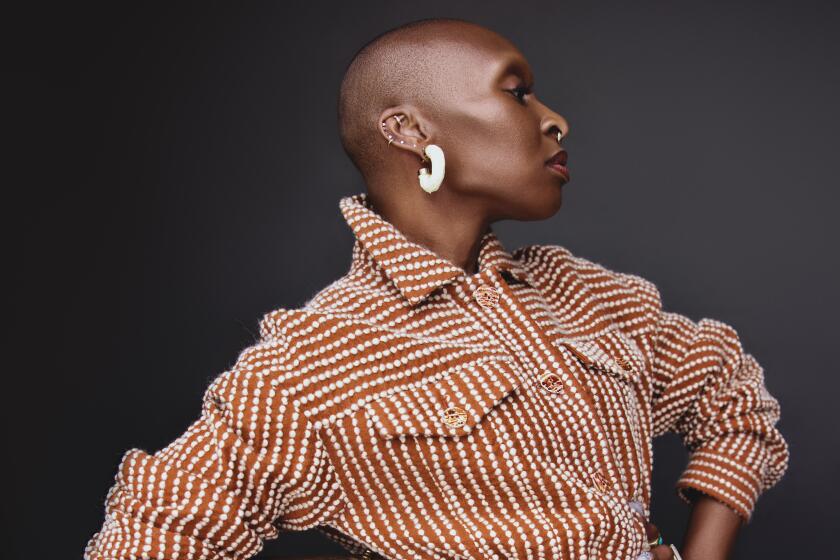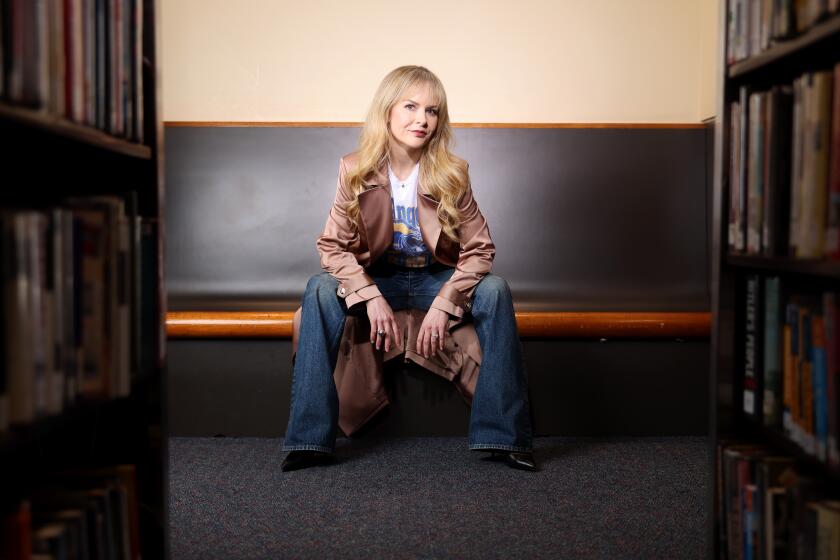Lin-Manuel Miranda’s face in a piece of toast?
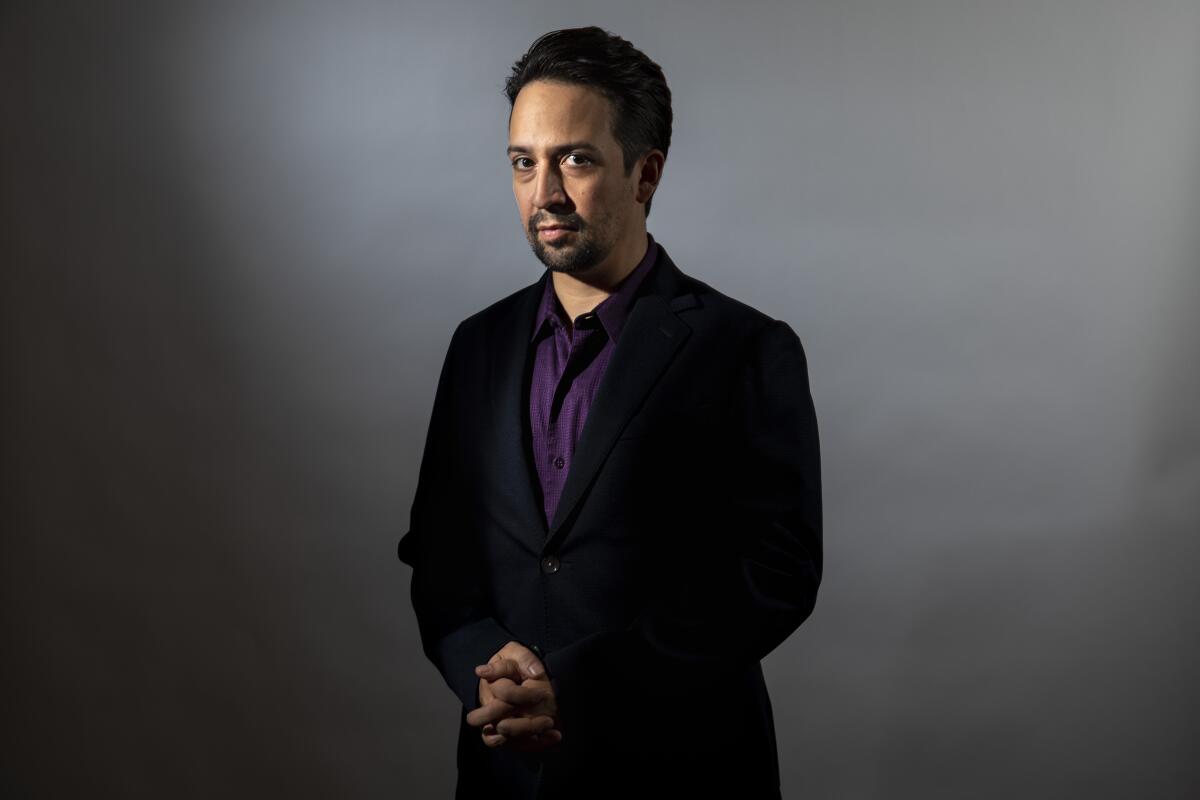
- Share via
I was eating breakfast the other day when I thought I saw Lin-Manuel Miranda’s face in my toast. The twinkling eyes, the aquiline nose, the trademark goatee limned in bits of bread and butter.
It didn’t surprise me, since I had dreamed of the larger-than-life composer the night before. In my dream he showed me around his latest venture: an amusement park built in honor of Miranda’s mega-hit musical “Hamilton.” Called “Hamilton Land,” the park featured outrageously priced Revolutionary War-themed hotel rooms, singing employees in Colonial costumes and waxwork sculptures of the Founding Fathers.
I’m arts and culture writer Jessica Gelt, and the near-total pop-culture domination of this musical-theater superstar is on my mind thanks to my daughters, 5 and 13, who never stop talking about him.
They aren’t alone. Miranda is everywhere you look (even in toast). Late last week, Times pop music critic Mikael Wood broke down the 42-year-old superstar’s cross-generational appeal through an examination of his prodigious songwriting and omnipresent entertainment profile, which includes being involved in four films released last year, as well as bumping Adele out of the top spot on the Billboard 200 chart with his soundtrack for the Disney animated hit “Encanto.”
Then there’s the breakout single from that soundtrack, “We Don’t Talk About Bruno,” which monopolizes my eighth-grader’s TikTok feed and is sing-shouted around my house at all hours of the day and night by both girls until I crouch in a corner in the dining room with my hands over my ears begging for them to please stop.
On Thursday, The Times ran another story about Miranda. This one, by Michael Ordoña, featured him in conversation with actor Andrew Garfield, who starred in Miranda’s studio feature directorial debut, “Tick, Tick…Boom!” Garfield, thanks to his mischievous grin, fabulous coif and milk-chocolate eyes, as well as his “Spider-Man” fame, is another favorite of my daughters, and the appearance of both performers palling around together in adorable photos broke household hearts and minds.
My 13-year-old just completed a unit in school about dystopian literature and themes, and was tasked with writing her own dystopian short story. Her lead character is named Lin-Manuel Miranda and he lives in a city called Madison that is controlled by a supreme ruler named Daveed Diggs.
Why did she choose Diggs to be a part of her story? Because the actor plays Thomas Jefferson in the version of “Hamilton” starring Miranda that is currently streaming (nonstop at my house) on Disney+.
The kid even requested a Thomas Jefferson outfit to wear to school, where she is currently being taught about the founding of America using “Hamilton”-themed worksheets, including one titled “Hamilton Song Analysis,” which features lyrics from the show that can be excavated to reveal nuggets of truth about history.
Miranda really is everywhere. In our schools, in our playlists, in our newsfeeds, on our screens, in our dreams. And, yes, even in our toast.
Art report
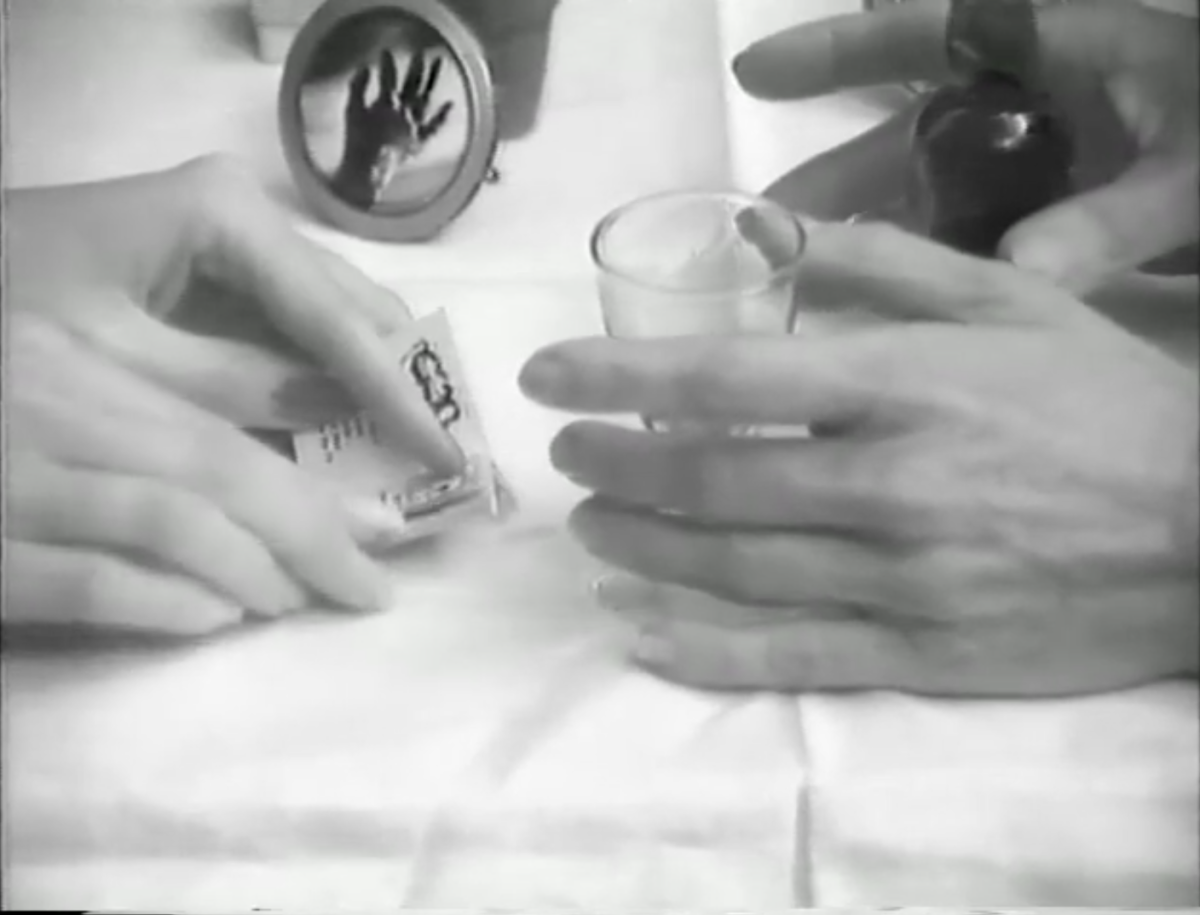
The Chicago nonprofit United States Artists has announced its 2022 fellows, six of whom hail from the Los Angeles area, writes Deborah Vankin. The awards, totaling $50,000 each, recognize creative work across 10 disciplines: architecture and design, craft, dance, film, media, music, theater and performance, traditional arts, visual art and writing. Sixty-three fellows were named this year — the largest class yet.
The local awardees, writes Vankin, are maestro and sonero César Castro “Jarochelo,” from L.A.; textile artist Melissa Cody, from Long Beach; multidisciplinary artist Sharif Farrag, from L.A.; director and artist Lars America Jan (who also goes by Lars Jan), from L.A.; poet Leroy F. Moore Jr., from L.A.; and musician and composer Jeff Parker, from Altadena.
Vankin’s story also contains this about the goals of the 16-year-old USA program: “This year’s class of fellows represents ‘a growing commitment to elevating and amplifying underrepresented voices,’ the organization said. Twenty percent of the honorees are native and Indigenous artists, and 17% are disabled individuals — the largest number of both groups in the nonprofit’s 16-year history. Most of the honorees in the architecture and design category identify as people of color.”
Artists Nancy Buchanan, Marcia Hafif and Barbara T. Smith are the subjects of a new survey at the Armory Center for the Arts, “how we are in time and space.” Vankin caught up with Buchanan and Smith for a fascinating Q&A that gets the pioneering artists talking about their early days of friendship in the late 1960s and early ’70s when they were “divorced, single mothers defying gender expectations while pursuing careers in art.”
An exhibition of Yui Yaegashi’s paintings titled “purple, black, fog,” on display at Parrasch Heijnen through Feb. 5, is examined by art critic Christina Catherine Martinez, who writes about what makes Yaegashi’s work distinctive: “These are quiet paintings. All set to eye level and scaled, intentionally or not, at about the size of a smartphone or tablet; privileged modes of vision du jour. They have a meditative presence suited to a vague, California-ish injunction to mindfulness, but they are unlike any other painting I see in L.A.”
Make the most of L.A.
Get our guide to events and happenings in the SoCal arts scene. In your inbox every Monday and Friday morning.
You may occasionally receive promotional content from the Los Angeles Times.
On the stage and in the field
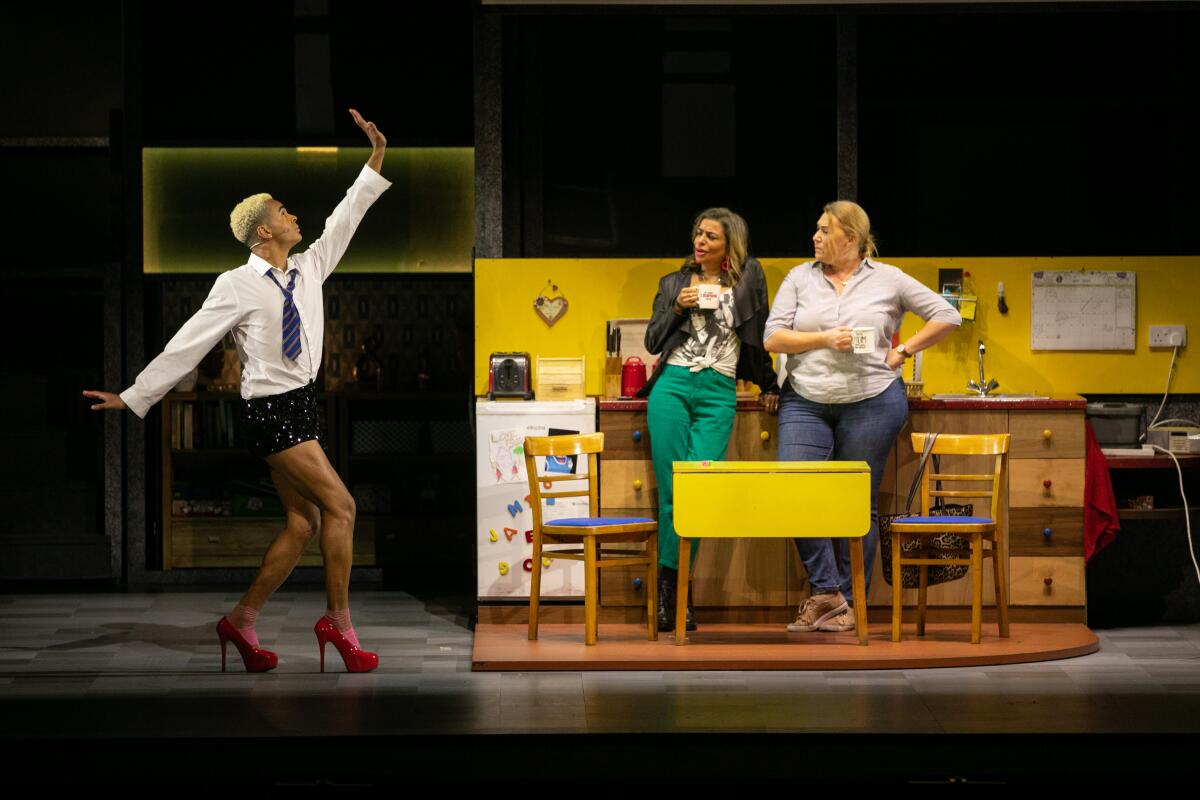
After spending nearly two years dark due to pandemic closures, Center Theatre Group returned to live performances with “A Christmas Carol” in early December, only to shut down two weeks later due to breakthrough COVID-19 infections in the cast. In a display of remarkable resilience, the Ahmanson pushed forward, opening the next show in its season, “Everybody’s Talking About Jamie,” just a month later.
Times theater critic Charles McNulty attended the opening-night performance but devoted the first part of his review to wondering about “the societal impact of attending theater in a viral hurricane.” McNulty said that, with the virus peaking and hospitals overwhelmed, he wished that performing arts organizations had hit the pause button for just a bit, waiting for the storm to die down.
He nonetheless found the show, which arrived on the West Coast from London’s West End, charming and heartfelt, and wished that it had landed in the city at a more opportune time.
“The genial musical wears its heart on its sleeve, and though it’s formulaic and sentimental, the force of goodwill coming from the stage is hard to resist,” wrote McNulty.
Margaret Gray focused her attention on Orange County, where South Coast Repertory is staging “Last Stop on Market Street,” the company’s first in-person Theatre for Young Audiences offering in two years.
The production “of the hip-hop- and Motown-imbued musical, adapted for the stage from a 2015 Newbery Medal-winning picture book, is set in Santa Ana,” writes Gray, who interviewed director Oanh Nguyen about how they based the set on an actual house in that city.
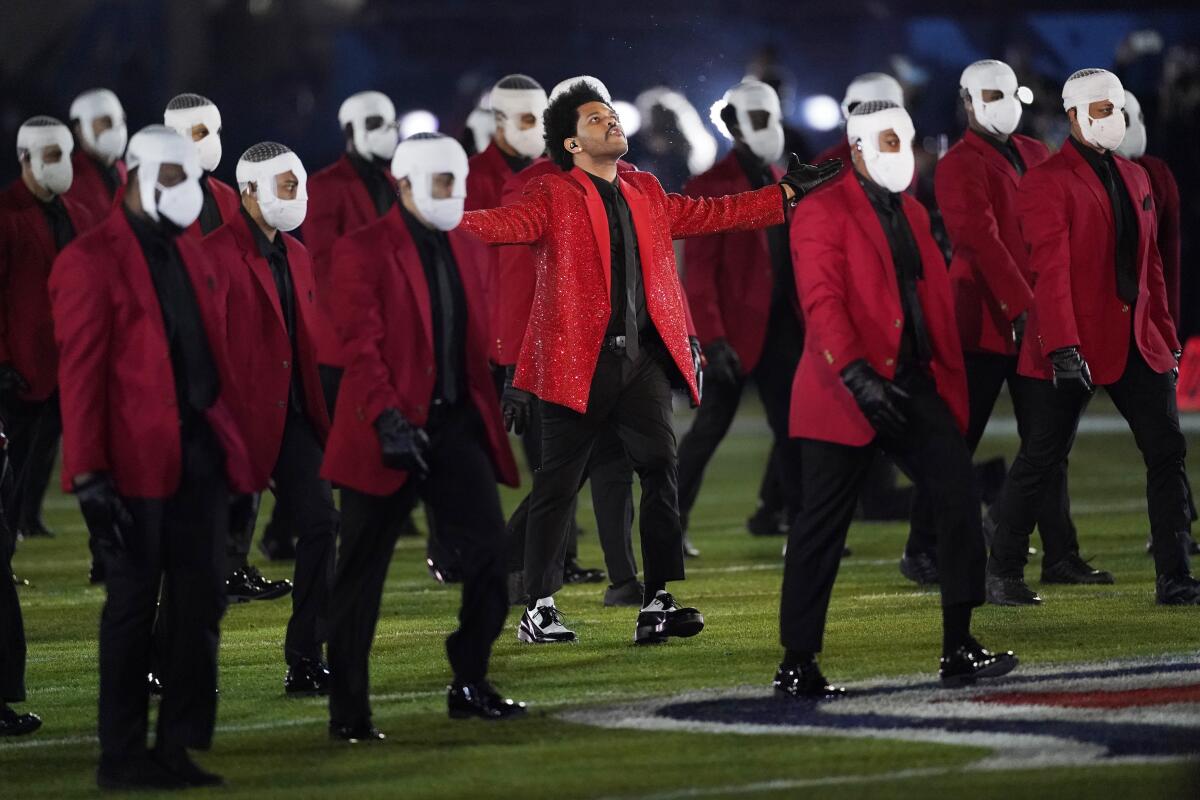
I dove into a dance-world controversy recently when I wrote about the treatment of dancers and others working for up to 72 hours as volunteers in the “field cast” during the Super Bowl halftime show. Dance activist Taja Riley brought visibility to the murky situation with an Instagram post after it came to her attention that a professional dance agency, Bloc L.A., had put out a call offering the opportunity to its clients.
Halftime choreographer Fatima Robinson told The Times in an interview that the only reason the call went out through Bloc was because she is a Bloc client. The agency, she said, was trying to see if any clients knew people who would like to volunteer.
Robinson and a casting manager who works with halftime show executive producer Roc Nation said that professional dancers were not being recruited to work for free, and that the show had hired 115 paid professional dancers through official avenues.
Riley maintained that all workers — dancers or not — should be paid for adding value to one of the biggest commercial sporting events of the year.
For a subsequent story, I interviewed a professional dancer who said he worked for free in last year’s Super Bowl halftime show featuring the Weeknd. He said he didn’t realize until he was deeply involved in the production that he was working side-by-side with dancers who were being paid. My source said the lines between paid and unpaid dancers seemed purposefully blurred by organizers.
SAG-AFTRA weighed in, saying that it had met with the halftime show’s producers and it had been agreed that no professional dancers would be recruited for the show. The call for payment coming from activists, however, remains unanswered.
Design time

Lisa Boone explains how a detached garage in West L.A. became a sleek ADU.
“Justin Nasatir and Mara Grobins Nasatir purchased a 1,200-square-foot house in West Los Angeles in 2017 with the goal of transforming the detached, two-car garage into an income-generating property,” Boone notes before detailing just how that was done.
The 600-square-foot stucco structure’s interior was divided into three living areas — a bedroom, a bathroom and an open kitchen and living room, “creating a living area that connects to the courtyard through a new set of bifold doors.”
Enjoying this newsletter? Consider subscribing to the Los Angeles Times
Your support helps us deliver the news that matters most. Become a subscriber.
Essential happenings
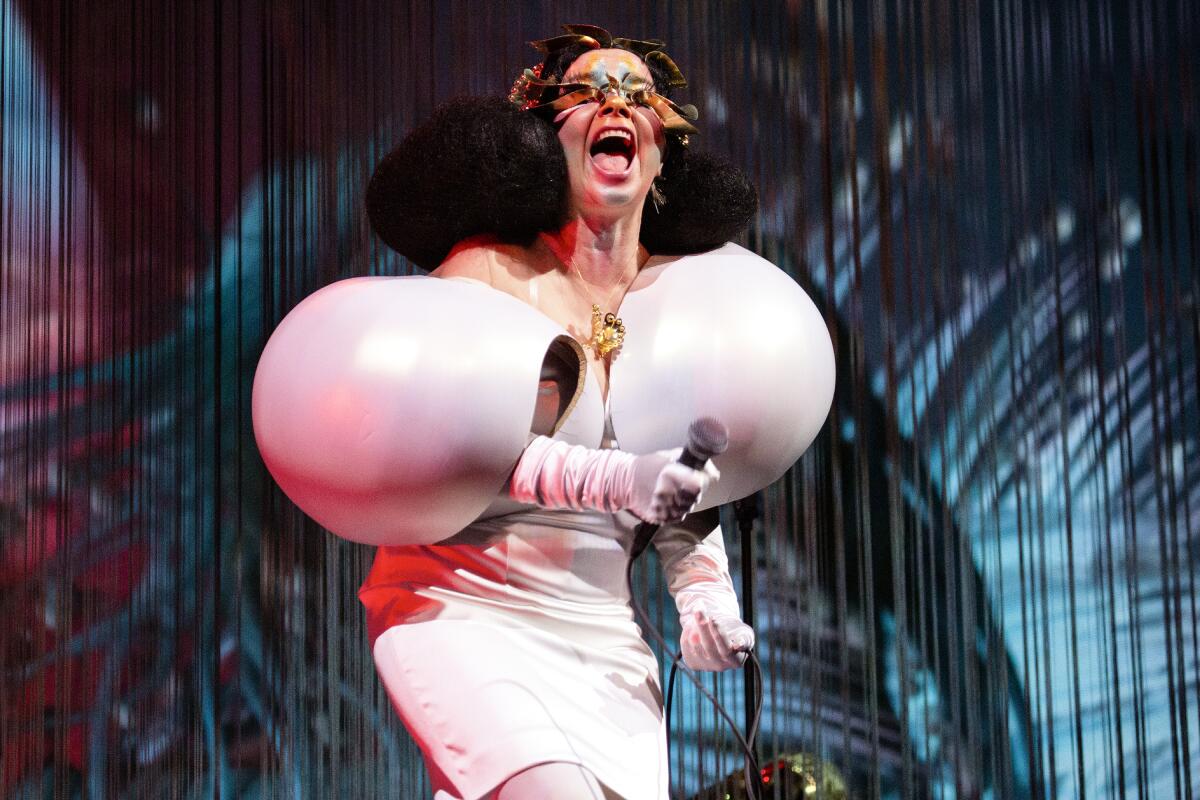
Listings coordinator Matt Cooper never lets us down, and he’s back this week with all the art happenings he finds fit to print. A highlight? Icelandic singer Björk will appear at the Shrine Auditorium in a “highly theatrical, multimedia-enhanced concert spectacular.”
Other offerings include New York’s Les Ballets Trockadero de Monte Carlo in Long Beach, “Tchaikovsky’s Violin Concerto” at Segerstrom Center, and the Queen’s Cartoonists, an ensemble performing jazz and classical favorites “to accompany screenings of classic and contemporary animated shorts from around the world.”
And last but not least ...
These Tik Tok dancers have the moves. “We don’t talk about Bruno, no no, no.”
The biggest entertainment stories
Get our big stories about Hollywood, film, television, music, arts, culture and more right in your inbox as soon as they publish.
You may occasionally receive promotional content from the Los Angeles Times.

